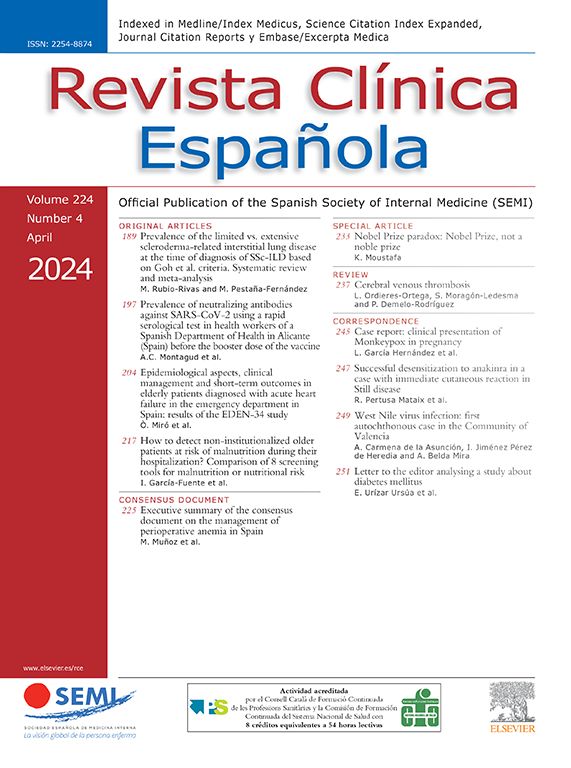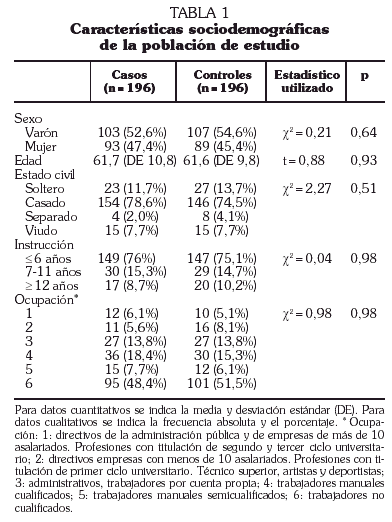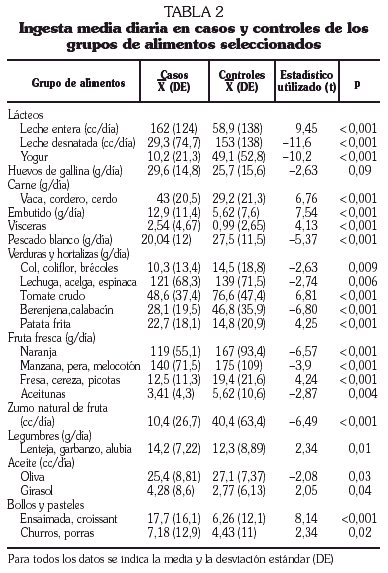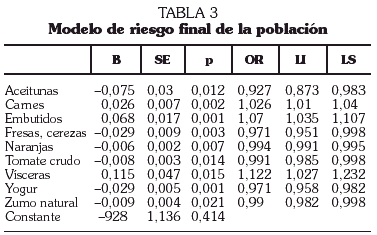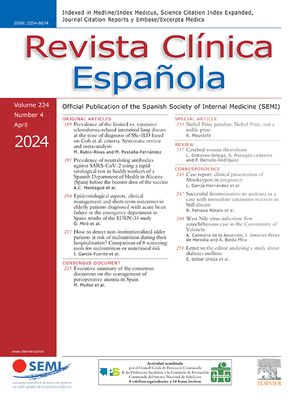Objetivo. Aunque el componente genético en el carcinoma colorrectal (CCR) está bien establecido, algunos factores ambientales, principalmente dietéticos, pueden favorecer su aparición. El objetivo de este estudio es evaluar la relación entre el consumo diario de grupos específicos de alimentos y la presencia de CCR. Métodos. Realizamos en un área de Madrid un estudio de casos controles, incluyendo 196 diagnósticos de CCR, con histología confirmada y registrados en el registro de tumores de la Comunidad de Madrid a fecha de mayo de 1998, que se compararon con 196 controles pareados por edad, sexo y ámbito geográfico. Todos respondieron a un cuestionario que incluía información sobre dieta, hábitos tóxicos, actividad física, fármacos e historia familiar de CCR. Resultados. El análisis de regresión logística mostró una asociación débilmente positiva para el consumo de carne (odds ratio [OR]: 1,02; intervalo de confianza [IC]: 1,01-1,04); vísceras (OR: 1,12; IC: 1,02-1,23), y embutidos (OR: 1,07; IC: 1,03-1,1), y una modesta asociación inversa para el consumo de yogur (OR: 0,97; IC: 0,95-0,98); tomate (OR: 0,99; IC: 0,98-0,99); fresas, cerezas (OR: 0,97; IC: 0,95-0,99); naranjas, pomelos y zumos naturales de fruta (OR: 0,99; IC: 0,98-1). Conclusiones. Estos resultados intentan sumar evidencias empíricas que habría que confirmar con estudios prospectivos.
Palabras clave:
cáncer colorrectal, dieta, carne, fibra, vegetales, fruta, calcio o productos lácteos
Objective. Although the genetic component in colorectal carcinoma (CRC) is well established, some environmental factors, mainly dietary, can favor its development. The objective of this study is to evaluate the relationship between daily consumption of specific food groups and development of CRC. Methods. We carried out a case-control study in an area of Madrid; 196 patients with diagnosis of CRC with confirmed histology and registered to May 1998 in the Community of Madrid tumor register were included, and they were compared with 196 controls matched by age, sex, and geographical area. All of them filled out a questionnaire with information on diet, substance abuse, physical activity, drugs, and family history of CRC. Results. The logistic regression analysis showed a weakly positive association with meat (OR: 1.02; CI: 1.01-1.04), viscera (OR: 1.12; CI: 1.02-1.23), and sausage (OR: 1.07; CI: 1.03-1.1) consumption, and a modest inverse association with consumption of yogurt (OR: 0.97; CI: 0.95-0.98), tomato (OR: 0.99; CI: 0.98-0.99), strawberries and cherries (OR: 0.97; CI: 0.95-0.99), oranges, grapefruits, and natural fruit juices (OR: 0.99; CI: 0.98-1). Conclusions. These results are an additional empirical evidence that must be confirmed through prospective studies.
Keywords:
colorectal cancer, diet, meat, fiber, vegetables, fruit, calcium, dairy products



